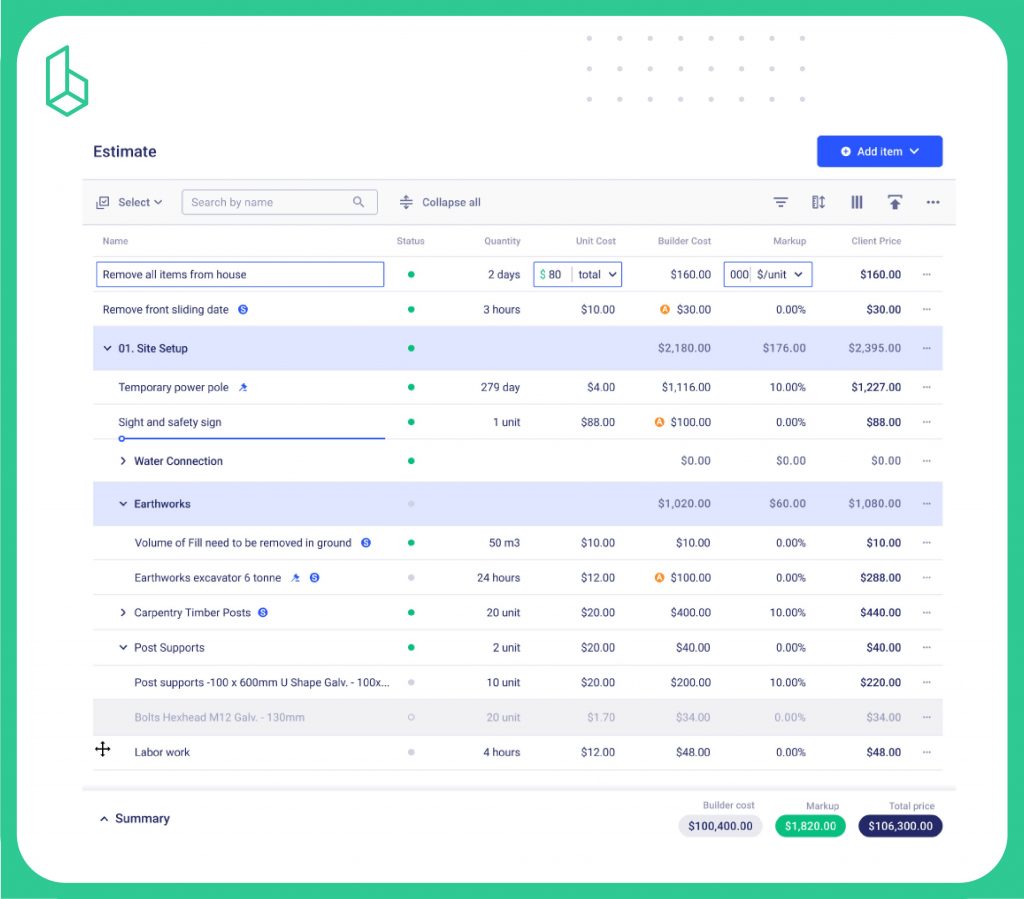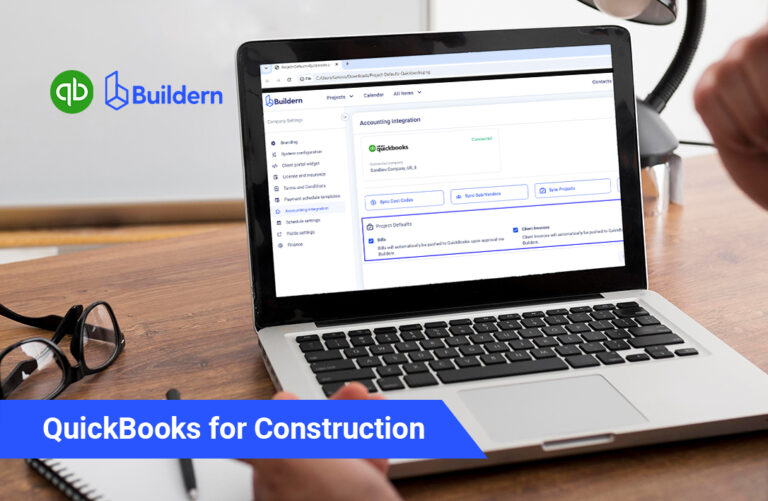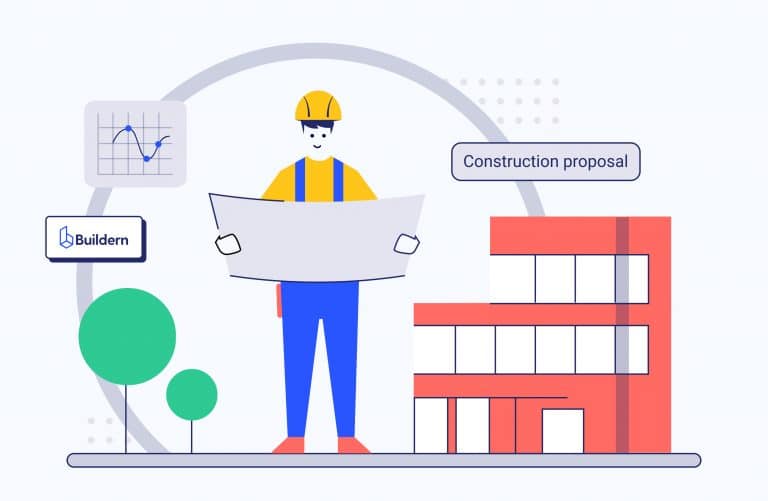Key Construction Company Goals Leading to a Successful Growth

The construction industry is enormous, ranking among the largest sectors in the world economy. The worldwide construction sector is projected to achieve an approximate value of $10.5 trillion by 2023, experiencing a steady growth rate of 4.2% annually. This upward trend is anticipated to persist, leading the industry to reach $12.9 trillion by 2028, with a compound annual growth rate (CAGR) of 4.4% from 2023 to 2028. Success in this highly competitive field hinges on strategic planning and flawless execution. However, construction companies need guidance in this fast-paced and demanding environment.
Clearly defining your construction company’s goals is crucial to stand out and attract new clients. Need help figuring out where to start? Don’t worry; Buildern is here to help. In this article, we’ll list essential construction company goals and teach you how to prioritize them.
Let’s not waste more of your time; let’s get started!
Goals That Lead to Success for a Construction Company and How to Achieve Them
1. Build a Strong and Efficient Team
Nothing is more important than having a professional team for a construction business. Most success factors depend on your employees, so you cannot afford to have workers who constantly fail in their tasks. If your roofer cannot build a maintainable roof or the plumber is not really good at repairing pipes and fixtures, your clients will hardly be satisfied with the results.
When building your team, try to hire professionals who have already been working on similar projects and know how to ensure quality results. But hiring skilled employees is only half of the job: most success depends on how your construction business will treat them. First, provide them with sufficient training so that they can learn all the details they might have skipped during their past projects. If you see that your employees excel at their jobs during work, show your appreciation with promotions, bonuses, and similar rewards.
Evaluate Communication and Teamwork from Within
Another way to maintain a strong team and reach success in construction is by having a healthy communication flow between the employees. It is crucial that all of the members of your team work together without confronting any major miscommunication issues. To learn more about managing a construction team effectively, check out Buildern.

Here’s how to evaluate whether your construction business is doing well on this task or not:
- Your employees communicate with each other during the project, which helps them understand how the process is going, some common problems and issues they face, and what remains to be done.
- After the project is completed, your employees can easily communicate with each other and see clear results. They examine the most common construction management challenges and difficulties, analyze the process and discuss what can be done better next time.

2. Develop a Strategy
Every business should have a clear vision and mission statement. So the first thing to do is to document it — define your company’s objectives in the mission section and describe what you imagine to achieve in the future in the vision.
When that’s done, you can develop an actionable plan to help you reach your construction company goals. Create metrics that will help you estimate how good your company is doing and celebrate whenever you witness significant growth.
Remember that one of the ways to follow your strategy is to divide it into smaller pieces. Create small, practical tasks that you can work on day by day and which, at the same time, help you reach your larger goals. Time management is key here, as you’ll fall behind without following your timeframes and milestones.
Of course, we understand that it is almost impossible to have everything planned out; that’s why it would be helpful for your construction business to also assess risks and have backup plans in case something goes wrong.
3. Set and Follow Safety Standards
Ensuring construction site safety is a must for all construction businesses. The construction site is known to be one of the most dangerous workplaces globally, with thousands of construction workers getting fatal injuries during work. Although it is impossible to ensure a 100% safe workplace, you should do your best to avoid accidents.
Here is what you should include in your safety plan:
- Safety training for your employees
- The potential risks that can happen during the project and how you can prevent them
- Workers’ compensation insurance
- COVID-19 prevention practices
And don’t forget to consult your employees when designing the safety plan, as they are the ones who actually work in the field and know all of the risks and accidents better.

4. Create a Succession Plan
Succession planning is when you develop a proper strategy for replacing or passing the leadership roles. With it, you identify potential leaders who can take on vacant positions when they arise.
As we’ve mentioned, your safety plan helps you pinpoint the potential risks, but you’ll also need a succession plan that can define who is going to take care of what during the crisis and what exact steps should be taken.
So prepare a written and documented succession plan that all your employees will know and agree on.
5. Take Care of Cybersecurity
We have mentioned site safety before, but one of the key goals for the construction company is to ensure safety in the digital world too. Yes, we’re talking about cybersecurity.
It doesn’t matter if your company is big or small — having your and your client’s data protected is crucial, as otherwise, you’ll put your contractors at risk of a cyber attack.
Constantly practicing vulnerability scans, making internal controls, and assessing risks will help your construction business stay safe from cybersecurity threats.
6. Deliver Consistent Customer Service
If you want to maintain your clients and build long-term professional relationships with them, you need to communicate with them throughout the project and allow them to participate in the decision-making process. And even if for whatever reason your company faces significant issues, try to explain it to your customers, showing exactly why problems arose.
Overall, communicating with dissatisfied clients and doing your best to solve their issues will make them happy with your services in the end, turning them into loyal customers.
One of the best ways to give your clients peace of mind is by letting them follow the project’s progress in real-time. They pay for your services, so they should clearly understand what is happening on their construction site. You will avoid misunderstandings and build a good rapport by communicating with your clients and keeping them up-to-date.
Here’s where Buildern comes in – offering the perfect solution to empower your construction business. Buildern goes beyond traditional construction project management software, providing the tools to achieve these goals and secure your path to success.
Users view it as a platform that allows them to communicate successfully with all the project stakeholders, from the owners to the on-site workers. It helps contractors record and track everything from project completion percentages to invoices. And by inviting your clients to Buildern’s project dashboard, they can easily follow the project’s progress and get a clear picture of what is happening on their construction site.

7. Make Smart Business Decisions
Working with serious large projects is pretty tough. And that’s what you do, most of the time, if you own a construction business. So, you should be able to make the correct choices and decisions, as every one of your decisions has the power to either contribute to your project’s success or be the reason for its failure.
So, when making an important decision:
- Take your time
- Analyze all the angles and options
- Objectively assess your project needs
- Think long-term: keep your company’s future in mind
- Remember your construction company goals and aspirations
8. Properly Invest in Your Construction Business

Finally, the last one on our list of goals for a construction company is putting in enough effort. Investing both time and money will help you reach success in construction quicker. So buy proper equipment and technology, train your employees, practice professional marketing, get good project management software, and put as much time into your construction business as possible.
Accelerating Project Estimation with Buildern’s Intuitive Interface and Powerful Features
Businesses focused on growth rather than momentum incomes need an efficient and accurate way to estimate their projects. The good old manual calculations are still the go-to solution for some, but advanced software solutions are proving to be a much faster and more accurate way to estimate projects. As a construction project management professional, you know that finding the ideal software to streamline processes is crucial for success. With numerous options available, it can be challenging to determine which platform best suits your company’s needs.
Buildern offers innovative construction estimating software that proves indispensable for accurate project planning, empowering construction companies to reach their goals with unprecedented efficiency and precision. In a fraction of the time, Buildern streamlines the estimation process with its user-friendly interface and robust features, empowering project managers to create detailed and reliable estimates.
Neatly organized and broken down into categories, the estimates created via Buildern impress even the most scrupulous client.
Buildern’s toolset is critical for ensuring operational efficiency and financial prudence in a competitive business landscape. Its comprehensive approach collates all job-related information into a single, easily accessible database. Such a functionality streamlines data management and empowers users to calculate profit margins accurately.
This construction cost estimator does more than just crunch numbers. It provides a strategic advantage, facilitating the groundwork for proposal submission and introducing you to a competitive bidding process. With Buildern, you’re not just keeping up with the competition but staying ahead.
Thus, companies can easily keep up with the fast-paced construction industry without sacrificing accuracy or time.

Recommended reading: No Penny Is Underlooked: 5 Types of Construction Cost Estimation
By utilizing advanced algorithms and each user’s custom project data, the software ensures that each estimate reflects real-world costs and complexities, leading to more informed decision-making and minimized risks. With Buildern, a project management tool from construction pros, you can now take advantage of the intuitive interface and powerful features that allow for fast and easy project estimates. This will save the builders time and effort they would otherwise spend on painstakingly manual estimations.
Furthermore, Buildern fosters collaboration among team members, enabling seamless communication and fostering a cohesive approach to project management. Whether you’re a small-scale contractor or a large construction firm, Buildern equips you with the tools needed to optimize your project planning and propel your company toward success.
Learn more about Buildern’s game-changing capabilities!

Find Your Top Priorities
Of course, it might change from business to business, but overall there are mainly three ways construction owners spend their time:
- Building long-term relationships with their customers
- Leading and overseeing their management team
- Doing work related to the construction project
To reach success in construction faster, you should figure out which work gives you the most return on your hard work. For instance, should you treat your clients to dinner or rather stay in the office and order materials?
Well, the answer is simple: you can find someone to order materials for you, but you’ll hardly find someone who can build customer relationships or employee trust instead of you.
Here are a couple of questions to ask yourself when prioritizing your tasks:
- Am I using my time and talent in the best possible way?
- Will the task that I’m doing help me reach my construction company goals?
- Will the work I’m doing help me maximize my construction business profits?
- Am I getting the biggest return on energy?
The problem is that many construction business owners find it challenging to organize their time efficiently, even when knowing their priorities. This is because from 7 AM, even before your day starts, your inbox starts to be filled with ASAP emails, customer requests, project issues, and thousands of problems or jobs, all of which require immediate attention!
So it can be overwhelming to leave that all aside and think clearly about which task you should focus on. Professional advice would be to learn to say no to some of the tasks that take your time from the ones that actually are worth working on. Keep the mentioned questions in mind, and never forget your key goals.
Another thing that can help you understand how to prioritize your goals is construction company KPIs. So let’s take a look at them.
KPIs for Construction: Brief Breakdown
Short for Key Performance Indicators, KPIs are a set of measurements used to assess the company’s long-term performance. They are mainly used to understand the company’s financial, strategic, and operational success compared to other companies in the same sector.
Using KPIs in the construction company comes with various benefits. They allow your construction business to assess precisely how successful the construction project has been. They are also a perfect tool for reaching your short-term financial objectives.
When it comes to KPI management, for any construction company, using the software can be one of the easiest solutions for defining and tracking construction company KPIs throughout the project.
5 Key Construction KPIs to Consider
1. Safety
If the construction site is safe, the possibility of unfortunate accidents decreases. Hence, the chance you’ll finish the project sooner and avoid extra costs is higher. Not to mention that ensuring your employees a secure and safe working field is simply a moral and ethical obligation.
So security measurements should be on the top of your list. Here are three crucial construction safety KPIs to keep an eye on:
- The rate of incidents
- The number of safety meetings
- The number of accidents per supplier
2. Quality Control
Overseeing the work and ensuring that high quality is maintained in every aspect of the project will help to reduce the chances of rework in the future. So it’s crucial to ensure the project follows all the quality requirements. Here are some construction company KPIs that can help you:
- The number of defects during the work
- The frequency of site inspections
- The amount of time dedicated to rectifying the defects
- The costs of the rework activities
- Internal customer satisfaction

3. Labor Productivity
When your employees are productive, the work gets completed faster and more efficiently. But how can you really estimate your workers’ productivity? Consider using these KPIs:
- The average revenue your construction business gets for every working hour
- Rate of the equipment downtime
- The amount of waste/recycling per job
- The percentage of labor downtime
4. Employee Satisfaction
If you find out that your employees are not productive in the workplace, it can be because of their lack of satisfaction with their work or the company. Measuring the level of employee satisfaction will help you understand if something is wrong with your company culture.
Employee satisfaction KPIs are:
- The number of training completed
- Turnover rate
- Worker satisfaction
5. Buyout Process
The buyout process begins when the general contractor wins a bid. During this process, the general contractor determines the percentage of work bought and tries to monitor the buyout for potential issues.
The main KPI here is:
- The time between when the general contractor wins the bid and when the subcontractor buys out.
Conclusion
The eight essential construction company goals that we’ve listed in the article will help you reach success in construction and grow your business quicker. But keep in mind that although knowing your goals is essential, you should know how to develop strategies that will help your business reach them.
And in case you need some tips and tricks on your way, don’t forget to check out some of our other construction management articles that might come in handy for project management.

![Detailed Construction Project Cost Breakdown [Examples Included]](https://buildern.com/resources/wp-content/uploads/2024/09/BLOG_Cover_Construction-project-cost-breakdown-2-copy-150x150.webp)


![Detailed Construction Project Cost Breakdown [Examples Included]](https://buildern.com/resources/wp-content/uploads/2024/09/BLOG_Cover_Construction-project-cost-breakdown-2-copy-768x501.webp)

